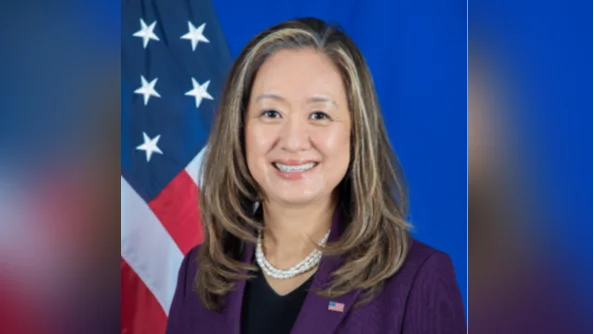Ambassador Julie Chung addressed Sri Lankan customs officials in Colombo, highlighting the importance of their role in protecting the country’s borders and combating drug trafficking. The event was part of a training initiative supported by the United States and the United Nations Office on Drugs and Crime (UNODC), with contributions from instructors including those from the World Customs Organization.
Chung stated, "It is an honor to stand before you today in Colombo, addressing a group of dedicated customs officials who play a critical role in safeguarding Sri Lanka’s borders and protecting its citizens. Your work, supported by training from the United States and the United Nations Office on Drugs and Crime (UNODC), is vital in the global fight against drug trafficking and the devastating consequences it brings. I also want to thank all the instructors including from the World Customs Organization who we hope to be continuing partners in this type of program."
She noted that drug trafficking remains a significant challenge worldwide, leading to over 500,000 deaths annually due to overdoses. In the United States alone, more than 100,000 people die each year from overdoses, primarily caused by synthetic opioids such as fentanyl. In Sri Lanka, hundreds of lives are lost yearly due to drug-related causes.
"Sri Lanka’s strategic location in the Indian Ocean makes it a critical transit point for international trade. Unfortunately, this also makes it vulnerable to exploitation by drug traffickers who use established shipping routes to move illicit substances and precursors. The training you have received equips you with the tools to detect illegal drug shipments, intercept precursor chemicals, and disrupt trafficking networks. Your vigilance and expertise are essential in preventing these substances from reaching their destinations and causing harm," Chung said.
The ambassador announced that the U.S. Embassy recently donated $115,000 worth of equipment to Sri Lanka’s National Dangerous Drugs Control Board (NDDCB). This donation aims to enhance local capacity for detecting synthetic drugs and precursor chemicals as part of broader regional efforts against synthetic drugs.
"I am proud to share that the United States is deepening its partnership with Sri Lanka in this fight. Recently, the U.S. Embassy in Colombo donated $115,000 worth of equipment to the National Dangerous Drugs Control Board (NDDCB) to enhance its capacity to combat synthetic drugs. This donation includes specialized tools for detecting synthetic drugs and precursor chemicals, which are critical in identifying and intercepting these substances before they can cause harm. This contribution is part of a broader regional effort to address the growing threat of synthetic drugs, and it underscores the United States’ commitment to supporting Sri Lanka’s efforts to protect its citizens and secure its borders," she said.
Chung emphasized collaboration between Sri Lankan authorities, UNODC, and U.S. agencies: "The United States and UNODC are proud to partner with Sri Lanka in this effort. Together, we are building capacity, sharing intelligence, and strengthening the global network needed to combat drug trafficking. But this is not just about enforcement—it is about saving lives. Every shipment you intercept, every network you dismantle, and every trafficker you bring to justice represents lives saved and communities protected."
She concluded by urging officials not only to focus on enforcement but also on reducing human suffering: "As you return to your posts, I urge you to remember the human cost of this fight. Behind every statistic is a story—a family grieving, a community struggling, a life cut short. Your work is not just about stopping crime; it is about giving people a chance to live free from the scourge of drugs."
"Thank you for your dedication, your courage, and your commitment to this mission. The United States stands with you, and together, we will continue to fight for a safer, healthier future for Sri Lanka and the world."

